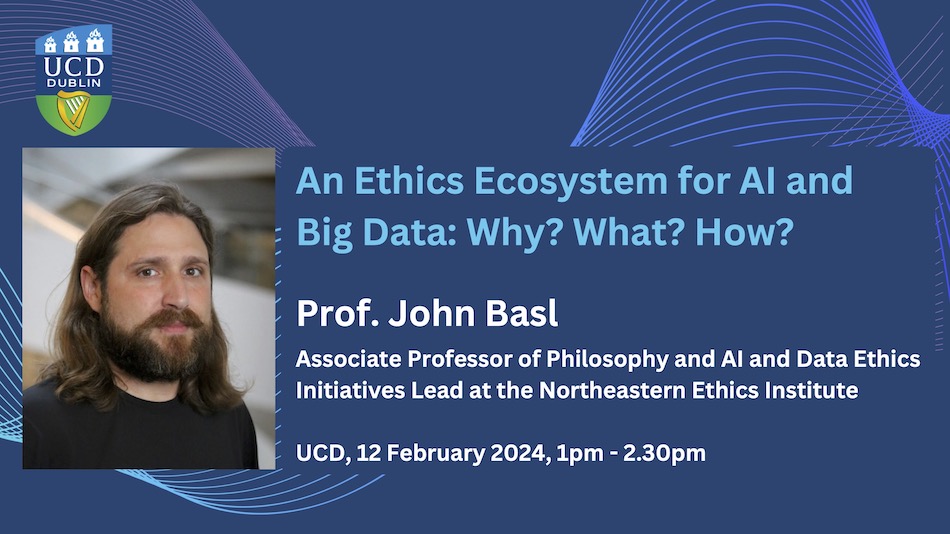Creating an ethics ecosystem for AI and big data: problems and solutions
Thursday, 15 February, 2024
On Monday, February 12th, John Basl, Associate Professor of Philosophy and AI and data ethics initiatives lead at Northeastern University’s Ethics Institute will give a talk in UCD entitled, An Ethics Ecosystem for AI and Big Data: Why? What? How?
Location: UCD Research (full details in attendee email) - This event is now sold out.

The military has one. So does legal practice. The finance industry, the world of medicine - tick, tick. So why doesn’t AI and big data have a serviceable ethics ecosystem?
This refers to a comprehensive and interconnected framework of ethical considerations, guidelines, policies, and practices designed to govern the development, deployment, and use of AI and big data technologies. A framework to mitigate hot button issues like algorithmic bias, transparency concerns, security risks and legal compliance.
“Every other domain where we do a decent job of managing technology has a robust ethics ecosystem,” says Dr John Basl. “Now, of course, they're criticisable. We don't love them. But when you talk about military ethics, they're not starting from the ground up. They have a set of concepts and ways they think about military decisions: there are laws, ethics and infrastructure.”
So what’s the problem with AI and big data?
“Right now we're in the unfortunate position where we don't have the ecosystem and building it is hard.”
It doesn’t work to apply ethics tools from other sectors to address AI and big data problems.
“When we use them in a new context, they often fail.”
Another problem is the need for interdisciplinary teams - often from polar opposite fields - to work together.
“Learning to communicate with a computer scientist takes days and days to be on the same page. Like, when we say 'fair', do we mean the same thing?” says Dr Basl, illustrating. “But recognising that we're going to have to keep doing that because it is the ultimate solution. These problems will not be solved by any one-off technical solution or any one-off ethical principle. It's the creation of this broader ecosystem.”
Another challenge is that the work to find those solutions is not evenly distributed at this point in time.
“Normally we wouldn't want computer scientists and data scientists to have to take full responsibility for their full product stack; it would be distributed across the ecosystem and we would all be playing a part. But right now we need those people to take on a larger role. But I think that they can. The more they know about orienting towards an ecosystem, the sooner we can get to such an ecosystem.”
Dr Basl is optimistic that it can be done, pointing to the fact that in other sectors, interdisciplinary experts - he gives the example of bioethicists - have been able to create a “common language” in specialism-diverse groups.
“I do think we'll get a handle on it. Getting a handle on it doesn't mean perfection. Doctors mess up all the time and there are medical scandals, but how often in the news cycle do you see a medical scandal? It's way more often that you see one in AI and big data. And it's not just attention bias on my part. There's just no infrastructure.”
Dr Basl hopes that those who attend his talk on Monday leave with an understanding of the need to coordinate efforts in this space.
“It's not just going to be individual technical solutions to individual ethics problems. We need to be working on those things, but with an eye towards creating an ecosystem and an awareness that we need to create interdisciplinary spaces. We're going to fail all the time but we have to keep going until we find a solution.”
This event is now sold out.